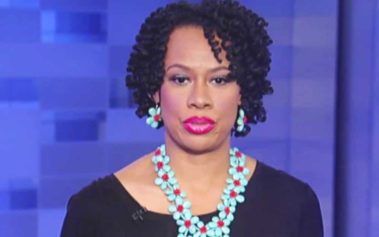It’s no secret Lisa Durden loves to talk. The Newark, N.J., native and self-proclaimed “Top Talker” has made a career of it as a popular media personality, commentator, celebrity blogger, motivational speaker and host of her self-titled talk show, The Lisa Durden Show.
So it was less than surprising when verbal fireworks erupted during Durden’s highly-publicized appearance on Fox News last month in a viral interview with conservative host and provocateur Tucker Carlson. During the heated exchange over a ‘Blacks-only’ event held by Black Lives Matter, Durden ruffled Carlson and his white viewers, mocking, “Boo-hoo-hoo, you white people are angry because you couldn’t use your ‘white privilege’ card to get invited to the Black Lives Matter’s all-black Memorial Day celebration! Wow!” The real surprise came later when the adjunct media professor was fired by Essex County College, although her appearance was in no way affiliated with the school.
At a time when both students and professors on college campuses are debating and being impacted by volatile issues involving free speech, Durden’s controversial termination from a predominantly Black college yet again raises troubling questions regarding when or if speech is actually safe or free.
“I think most people, no matter what their race, don’t agree with stifling someone’s free speech, because that means you’re next,” says Durden, reemphasizing “you are next. It’s not just about Lisa Durden the adjunct professor, it’s about anyone” with a job, whether you “work at the post office, Dunkin Donuts or are a doctor.”
Durden clarifies where the blame lies for her removal. After acknowledging many African-Americans feel Fox is a “racist network” and some of her associates feel it is behind her firing, Durden insists such opinions miss the mark. “I was not dragged there sleepwalking, I was not a victim, I came there to debate Tucker Carlson and then get out the building.” she says. “Who fired me was Dr. Munroe and Dr. Lee at Essex County College. That’s the problem, because Fox gave me free speech.”
Apparently, by firing Durden, many feel Essex County College revealed itself as an unsafe space for free speech. Since her June release, there’s been a diverse outpouring of support for the professor and ongoing demands for her reinstatement. The college has been heavily criticized for denying the former adjunct professor due process and freedom of expression. “While we may not agree with every point Durden made, we firmly oppose this lack of due process that led to Durden’s termination,” said American Federation of Teachers of New Jersey (AFTNJ) president Donna Chiera in a recent AFTNJ article. A change.org petition set up by Educators & Students United to Reinstate Professor Lisa Durden, which currently has close to 2500 signatures, states “Instead of defending Professor Durden’s right to free speech and congratulating her on standing up to racism and sexism, the administration at the Predominantly Black Institution chose to effectively fire this accomplished media professional and educator.” And in a recent NJ.com poll asking if Durden should have been fired for her appearance, two thirds of respondents voted “No.”
In a June video and written statement from Essex County College president Anthony E. Munroe, Munroe said the institution “deeply values free speech and academic freedom” and “supports and affirms the right of free speech and independent views and expressions of those views for our faculty and staff.” Munroe, who claimed the school was “immediately inundated with feedback from students, faculty and prospective students and their families” after Durden’s appearance, also stated, “Racism cannot be fought with more racism” although he failed to clarify what instance of racism he was referring to. Similarly, Jeffrey Lee, the college’s vice president for academic affairs, told NJ.com the college “promotes a community of unity that is inclusive of all.”
Some Essex County College professors see things differently. “As a woman, I’m horrified that my employer would treat a fellow woman professor this way for simply exercising her Constitutional right to free speech and her contractual right to academic freedom,” says communications professor Jennifer Wager, one of a number of the college’s teachers to speak out against Durden’s firing. The former colleague suggests Durden’s release likely had more to do with her being an African-American woman “calling out a white male TV news host on his white privilege and, by extension, the system of white supremacy on Fox News.” This, says Wager, is representative of “a phenomenon we see right now in the country where neo-fascist groups and individuals are targeting public intellectuals—mainly, although not exclusively African-American—that address the system of white supremacy.”
Wager references the recent targeting, threatening and punishing of college professors who have spoken publicly on issues of race, police brutality and white supremacy. Among them is the much-publicized case of Johnny Eric Williams, an associate professor of sociology at Trinity College in Connecticut whose campus shut down for a day due to threats after conservative sites shared his Facebook posts on race; and the cancellation of scheduled public talks by Keeanga-Yamahtta Taylor, an assistant professor of African-American studies at Princeton who received death threats for criticizing President Trump in a commencement address at Hampshire College.
Still, the free speech denial issue has been less than one-sided as conservatives have also criticized numerous high-profile instances of banned speakers and event cancellations at colleges involving the likes of professional provocateur Milo Yiannopoulos, right-wing pundit Ann Coulter and political scientist Charles Murray. A number of states are introducing legislation to protect free speech on campus.
Regarding the recent spate of online harassment and threats towards academics, the American Association of University Professors released a statement in response. “The AAUP does not dispute the First Amendment rights of [politically oriented news and other] organizations, nor does it call for government censorship or sanction against them. It does, however, condemn efforts to intimidate or silence faculty members, and it urges others to do so, as well. Governing boards of colleges and universities have a responsibility to defend academic freedom and institutional autonomy, including to protect institutions from undue public interference, by resisting calls for the dismissal of faculty members and by condemning their targeted harassment and intimidation.”
Durden and Wager, who have collected the screenshots of the individuals who implored others to complain to Essex County about her Fox appearance, insist such online tactics represent a small, concerted effort to attack and denounce anyone challenging equity, whiteness, police brutality and Donald Trump. “They target public intellectuals such as Professor Williams and Princeton’s Professor Taylor to try to silence any public discourse that is critical of white supremacy,” says Wager, noting “it’s part of what I see as a neo-fascist trend against those who speak out against racism and sexism.”
Nonetheless, the targeting and subsequent firing of Durden has done little to quell the outspokenness of a woman, media personality and professor who loves to speak freely, whether the space is safe or not.
“Dr. Munroe likes to quote Martin Luther King,” says Durden, noting the college president’s reference to the iconic civil rights leader in his June statement. “Well, I’m going to offer a quote that I like from Martin Luther King as well” one “Dr. Munroe and Dr. Lee clearly need to read, because those two men are the reason I am out of that building.”
“The ultimate measure of a man is not where he stands in moments of comfort and convenience, but where he stands at times of challenge and controversy.”

